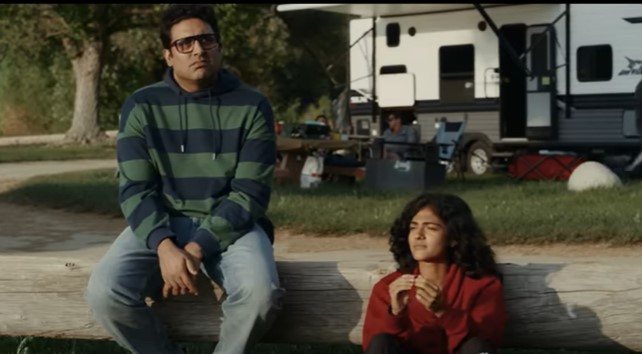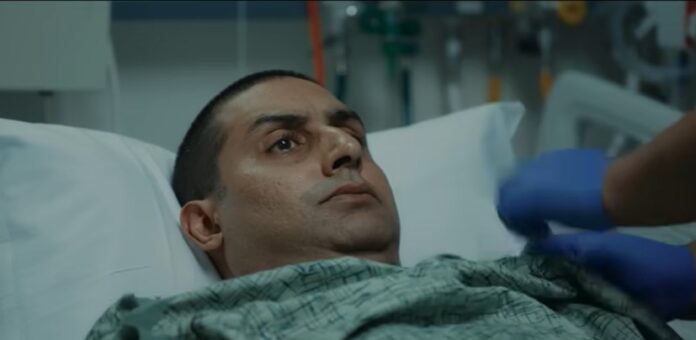November 22, 2024: Shoojit Sircar’s I Want To Talk is a poignant exploration of life, death, and the spaces between, anchored by a powerful performance from Abhishek Bachchan. In a film that delves into the grim realities of terminal illness, Sircar continues his thematic obsession with mortality, creating a narrative that is both unsentimental and yet deeply human.
Bachchan plays Arjun Sen, a successful marketing professional based in California, whose life is upended after a sudden cancer diagnosis. Initially, Arjun is a cold, business-driven character, distant from his daughter Reya (played by Ahilya Bamroo as a teenager, with Pearle Dey as the younger version), and seemingly detached from everything beyond his professional success. Bachchan’s portrayal of Arjun is not about showcasing vanity or charm, but rather a raw, unflinching realism as his character undergoes an unrelenting series of surgeries and treatments. There’s no grand transformation; Arjun is not suddenly enlightened by his illness, but instead, he perseveres through it with a quiet, stubborn resilience.
From the moment Arjun receives his diagnosis, the film’s pacing doesn’t allow for long stretches of reflection. Sircar keeps the narrative moving briskly, capturing Arjun’s quick transitions between surgeries and moments with his daughter, which makes the passage of time feel organic. This speed, while keeping the film from becoming overly sentimental, also serves to highlight the unrelenting nature of his illness—nothing slows down, not even his suffering. The rapid editing and the evolution of Reya from child to teen further emphasize the relentless march of time that Arjun cannot outrun.
At its core, I Want To Talk is a two-hander, a father-daughter drama with the cancer diagnosis acting as a third, silent character. Reya’s emotional arc provides the film’s heart. While Arjun battles the physical and emotional toll of his illness, Reya must navigate the difficult terrain of being a child to a man who refuses to show weakness, a daughter to a father who doesn’t want to be pitied. Bamroo’s performance is a standout, capturing the spectrum of emotions—panic, affection, resentment—that Arjun cannot express. Her warmth contrasts with Arjun’s emotional coldness, making their dynamic both frustrating and tender.
I Want To Talk: Abhishek Bachchan’s Unflinching Performance Anchors an Unsentimental Journey

Bachchan’s turn as Arjun is a study in restraint. He wears his physical transformation—the bloated stomach, the scars—without complaint, using his body as a tool for the performance, unafraid to show the wear and tear of cancer. His portrayal of a man who clings desperately to life but has nothing left to say is one of his more understated yet effective performances in recent years. While some might feel that the role could have been a showier one (especially with the late, great Irrfan Khan originally attached), Bachchan’s refusal to lean into traditional emotional cues is a refreshing choice in a genre often prone to melodrama.
Despite its understated nature, I Want To Talk occasionally falters in its emotional weight. The film, as much as it tries, doesn’t quite tug at the heartstrings the way it should. The pacing, while effective, leaves little room for us to fully connect with the emotional nuances of Arjun’s journey. There’s a detachment that serves the film’s themes but also keeps us at arm’s length from truly feeling the devastation of his condition.
The film also lacks the visual flair that made Sircar’s previous collaborations, like October and Sardar Udham, so visually striking. Cinematographer Avik Mukhopadhyay’s approach here is more conventional, and the decision to shoot much of the film in California limits the opportunity for the visual language to be as immersive or intimate as Sircar’s previous work. However, the film’s simplicity and lack of indulgent flourishes are ultimately in keeping with its no-nonsense tone.
In the final moments, I Want To Talk takes a turn toward sentimentality with a direct address to the audience by the “real” Arjun, but it’s a moment that feels unnecessary. The film’s quiet strength had already made its point, and this final attempt at audience connection feels more like a contrived appeal for sympathy than a natural extension of the narrative.
Overall, I Want To Talk is a film that doesn’t shy away from the harsh realities of illness but also refuses to indulge in the usual trappings of cancer dramas. It’s a film about survival, not for a cause or a grand emotional release, but simply for the sake of enduring. Arjun’s grit is admirable, but it’s his daughter Reya’s humanity that leaves the most lasting impression.

